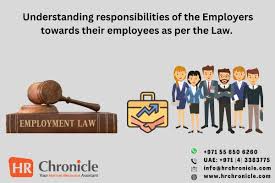An Overview Of Labor And Employment Law For Both Employers And Employees

The workplace is built on a balance of rights and responsibilities. Employees depend on fair treatment, while employers rely on a productive and compliant workforce. This connection is defined by labor and employment law, which lays out the regulations governing everything from hiring procedures to workplace safety. Firms like Dhillon Law are often relied upon to help both employees and employers navigate complex labor and employment regulations with confidence. Understanding this area of law is critical for both employees and employers, as it ensures fairness, compliance, and mutual respect in the workplace.
What Is Labor And Employment Law?
The term “labor and employment law” refers to a broad category of laws and norms intended to regulate the interaction between employers and employees. These laws cover issues such as wages, working hours, workplace safety, benefits, discrimination, collective bargaining, and termination of employment. While labor law often deals with unions and collective worker rights, employment law typically focuses on the rights and responsibilities of individual employees and their employers. Together, they create a comprehensive legal structure for modern workplaces.
Employee Rights Under The Law
Employees are entitled to certain protections regardless of the type of work they perform. These rights include:
- Fair Wages And Hours: Laws require employers to pay at least the minimum wage and comply with overtime rules.
- Non-Discrimination: Workers must be free from discrimination based on race, gender, religion, age, disability, or other protected categories.
- Safe Work Environment: Employers are required to create safe working environments and to adhere to health and safety regulations.
- Leave and Benefits: In many jurisdictions, employees are entitled to family leave, medical leave, with perks like health insurance or retirement contributions, contingent on the size of the business and legal requirements.
Knowing these rights empowers employees to recognize when violations occur and seek remedies through proper legal channels.
Employer Responsibilities
Employers also have responsibilities that go beyond providing paychecks. They must create policies that align with labor and employment laws, train managers on compliance, and establish reporting systems for complaints. Additionally, employers need to maintain accurate records of hours worked, wages paid, and safety measures implemented. By fulfilling these obligations, businesses not only stay out of trouble with the law but also foster loyalty and trust among their employees.
Addressing Workplace Discrimination And Harassment
Discrimination and harassment are among the most serious challenges in employment law. Employers are required to ensure that hiring, promotions, and daily workplace practices are free from bias. Harassment, whether verbal, physical, or digital, must be addressed promptly through established complaint procedures. Employees who experience discrimination or harassment have the right to report these issues without fear of retaliation. Employment law provides remedies such as reinstatement, compensation, or policy changes to correct such violations.
Collective Bargaining And Labor Relations
For unionized workplaces, labor law governs the relationship between employers and labor organizations. Collective bargaining agreements outline wages, benefits, and working conditions, ensuring that groups of employees can negotiate collectively rather than individually. Employers must recognize and negotiate in good faith with unions, while employees gain strength through collective representation. These agreements often serve as the foundation for maintaining stability in industries with complex labor needs.
Dispute Resolution
Despite legal protections, disputes in the workplace are inevitable. Conflicts may arise over unpaid wages, wrongful termination, or unsafe conditions. Labor and employment law provides structured ways to resolve these issues, from filing complaints with government agencies to mediation, arbitration, or litigation. Employers and employees both gain from knowing these procedures since they reduce disturbance and preserve peace in the workplace.
Why Understanding The Law Matters?
For employees, understanding labor and employment law ensures that they can recognize unfair practices and take action when necessary. For employers, it prevents costly lawsuits, fines, and reputational damage. More importantly, knowledge of the law fosters a workplace culture where fairness, respect, and compliance are prioritized. This understanding also helps businesses remain competitive by building strong, motivated teams in a legally sound environment.
Conclusion
Labor and employment law forms the backbone of the modern workplace, protecting employees from unfair treatment while guiding employers in creating safe and compliant environments. By understanding the rights and responsibilities it defines, both workers and business owners can foster better relationships and reduce conflict. Ultimately, this area of law is not just about legal compliance—it is about promoting fairness, stability, and productivity in every workplace.



